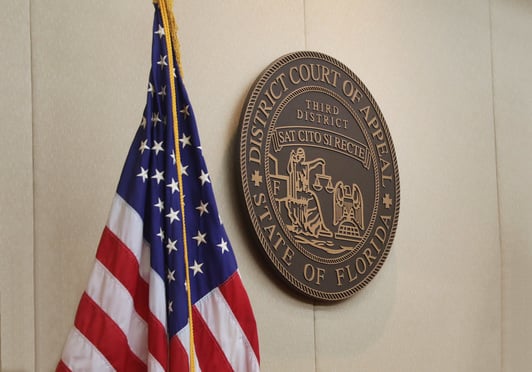Lawyer Guidance: Advise Clients of New Ruling and Hidden Consequences of Garnishment Writs
The court found that the appellant's guaranty was written in plain language that vested the bank with expansive collection rights.
May 04, 2020 at 05:18 PM
4 minute read
 08/16/19- Miami-Seal of the Third District Court of Appeal.
08/16/19- Miami-Seal of the Third District Court of Appeal.
A South Florida lawyer is sounding the alarm bells after an appellate court ruling in a dispute between a lender and borrower. He says debtors who agree to writs of garnishment might also run the risk of losing their wage exemptions.
James D. Silver, a partner at Kelley Kronenberg in Fort Lauderdale, says traditionally enforcing a judgment by obtaining a writ of garnishment has been among the "arsenal of remedies of creditors."
But a Florida appellate court decision shows that this might not be the best practice, said Silver, who is not involved in the litigation but is a bankruptcy expert that the Daily Business Review named "Most Effective Lawyer" in 2013.
Florida's Third District Court of Appeal issued the opinion in Hector M. Castro v. Mercantil Commercebank. The court ruled in favor of the bank, who was represented by Victor K. Rones, a lawyer in private practice in North Miami Beach.
Read the full opinion:
The court found that Castro's guaranty was written in plain language that vested the bank with expansive collection rights. The document included a provision which was capitalized in the guaranty: "Guarantor hereby consents to the attachment or garnishment of his/her/its earnings."
The court ruled that since Castro had signed the guaranty, he not only consented to garnishment, but he also renounced any claim of exemption of his head-of-household earnings. The court pointed out that regardless of the contractual terms, the bank was already "statutorily endowed with the 'right to a writ of garnishment.'"
Castro's lawyer, Lisette Blanco, who has a private practice in Miami Lakes, said that in 2009, Castro, a general contractor, needed a $250,000 loan for his business. The bank required him to personally guarantee the loan.
In the appeal Castro filed with the Third DCA, Blanco pointed out there was a revision to Florida Statute section 222.11(2)(b) in 2010 which required the bank to obtain the guarantor's signature next to any waiver of head-of-household wage exemptions.
"It is important for the ability to know even though it may appear in a one-line sentence that my client waived his garnishments, there was no line next to that waiver, acknowledging he read it," Blanco said. "It was language behind the guarantee. The court should have noted these different factors, and that the statue changed afterwards."
The Third DCA found "no merit" to the claim that Castro could rely on avoiding the garnishment based upon a subsequent modification of the statute, such as the one that now requires that a loan document include the borrower's or guarantor's signature next to the waiver of wage exemption and acknowledging that the bank can obtain a writ of garnishment. Castro's argument was rejected because the court found that the guaranty provided that no future change in the law would affect Castro's liability under the guaranty.
Blanco points out an inherent unfairness with these types of adhesion contracts, such as the one that Castro was forced to execute. Even with an attorney, she says, the borrower is generally unable to make any changes to these loan documents.
"You basically have to accept whatever they have to put there in order to get the funding that you need for whatever reason that it is," Blanco said. "So there are many people this has probably happened to that have signed guarantees or documents where they waive garnishments not knowing they were waiving exemptions."
Based upon the change in the exemption statute in 2010, Silver says lawyers representing borrowers and guarantors need to find out if their clients waived their right to argue that their wages are exempt from garnishment, as a heads of household under Florida law.
"Assuming that you don't file bankruptcy, that could be impactful in a negative way for the person who waives a writ of garnishment," Silver said. "Having said that, if you are dealing with someone who is advancing you a loan and they want that protection waived, unless you have a lot of different lenders willing to make you that same loan, you may not have a whole lot of bargaining power to say, 'Take that out.'"
This content has been archived. It is available through our partners, LexisNexis® and Bloomberg Law.
To view this content, please continue to their sites.
Not a Lexis Subscriber?
Subscribe Now
Not a Bloomberg Law Subscriber?
Subscribe Now
NOT FOR REPRINT
© 2025 ALM Global, LLC, All Rights Reserved. Request academic re-use from www.copyright.com. All other uses, submit a request to [email protected]. For more information visit Asset & Logo Licensing.
You Might Like
View All
Financially Grounded: South Florida-Based Silver Airways Files for Bankruptcy


US Judge Throws Out Sale of Infowars to The Onion. But That's Not the End of the Road for Sandy Hook Families
4 minute read
Growing Referral Network, Alternative Fees Have This Ex-Big Law’s Atty’s Bankruptcy Practice Soaring
5 minute readLaw Firms Mentioned
Trending Stories
- 1Public Notices/Calendars
- 2Wednesday Newspaper
- 3Decision of the Day: Qui Tam Relators Do Not Plausibly Claim Firm Avoided Tax Obligations Through Visa Applications, Circuit Finds
- 4Judicial Ethics Opinion 24-116
- 5Big Law Firms Sheppard Mullin, Morgan Lewis and Baker Botts Add Partners in Houston
Who Got The Work
J. Brugh Lower of Gibbons has entered an appearance for industrial equipment supplier Devco Corporation in a pending trademark infringement lawsuit. The suit, accusing the defendant of selling knock-off Graco products, was filed Dec. 18 in New Jersey District Court by Rivkin Radler on behalf of Graco Inc. and Graco Minnesota. The case, assigned to U.S. District Judge Zahid N. Quraishi, is 3:24-cv-11294, Graco Inc. et al v. Devco Corporation.
Who Got The Work
Rebecca Maller-Stein and Kent A. Yalowitz of Arnold & Porter Kaye Scholer have entered their appearances for Hanaco Venture Capital and its executives, Lior Prosor and David Frankel, in a pending securities lawsuit. The action, filed on Dec. 24 in New York Southern District Court by Zell, Aron & Co. on behalf of Goldeneye Advisors, accuses the defendants of negligently and fraudulently managing the plaintiff's $1 million investment. The case, assigned to U.S. District Judge Vernon S. Broderick, is 1:24-cv-09918, Goldeneye Advisors, LLC v. Hanaco Venture Capital, Ltd. et al.
Who Got The Work
Attorneys from A&O Shearman has stepped in as defense counsel for Toronto-Dominion Bank and other defendants in a pending securities class action. The suit, filed Dec. 11 in New York Southern District Court by Bleichmar Fonti & Auld, accuses the defendants of concealing the bank's 'pervasive' deficiencies in regards to its compliance with the Bank Secrecy Act and the quality of its anti-money laundering controls. The case, assigned to U.S. District Judge Arun Subramanian, is 1:24-cv-09445, Gonzalez v. The Toronto-Dominion Bank et al.
Who Got The Work
Crown Castle International, a Pennsylvania company providing shared communications infrastructure, has turned to Luke D. Wolf of Gordon Rees Scully Mansukhani to fend off a pending breach-of-contract lawsuit. The court action, filed Nov. 25 in Michigan Eastern District Court by Hooper Hathaway PC on behalf of The Town Residences LLC, accuses Crown Castle of failing to transfer approximately $30,000 in utility payments from T-Mobile in breach of a roof-top lease and assignment agreement. The case, assigned to U.S. District Judge Susan K. Declercq, is 2:24-cv-13131, The Town Residences LLC v. T-Mobile US, Inc. et al.
Who Got The Work
Wilfred P. Coronato and Daniel M. Schwartz of McCarter & English have stepped in as defense counsel to Electrolux Home Products Inc. in a pending product liability lawsuit. The court action, filed Nov. 26 in New York Eastern District Court by Poulos Lopiccolo PC and Nagel Rice LLP on behalf of David Stern, alleges that the defendant's refrigerators’ drawers and shelving repeatedly break and fall apart within months after purchase. The case, assigned to U.S. District Judge Joan M. Azrack, is 2:24-cv-08204, Stern v. Electrolux Home Products, Inc.
Featured Firms
Law Offices of Gary Martin Hays & Associates, P.C.
(470) 294-1674
Law Offices of Mark E. Salomone
(857) 444-6468
Smith & Hassler
(713) 739-1250






